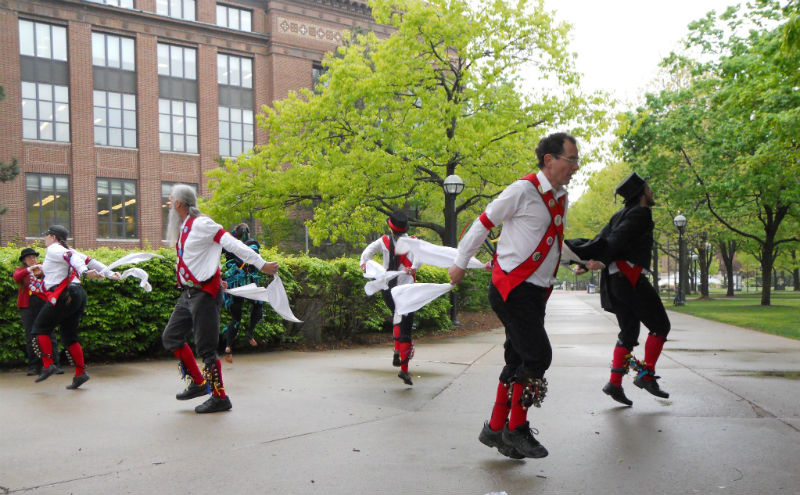Singing and dancing through Ann Arbor the Morris way

While the exact origins of Morris dancing are not clear, historians do know that people have been participating in this lively step dance for centuries. Shakespeare mentioned it in his plays. Peasants enjoyed it along with their summertime ales in the 1600s. The first known written reference dates to 1448 when Goldsmiths’ Company in London paid seven shillings to Morris dancers for a performance.
And in the Ann Arbor area, dancers have gathered since 1976 to engage in this energetic form of folk dancing. Ann Arbor Morris dancer Carol Mohr enjoyed international folk dancing and fell in love with Morris in the late 1970s.
Callie Feyen's "The Teacher Diaries: Romeo and Juliet" encourages kids to read in the internet age

Callie Feyen's new book begins with a kiss. But the writing of said book began with an essay -- one she wasn’t particularly keen to write.
“My editor at [T.S. Poetry Press] asked me if I wanted to write about teaching Romeo and Juliet to eighth graders. But at the time I thought it would be too painful.”
The longtime middle school teacher felt that way after she found herself at a school where lesson plans were scripted and tightly monitored; teachers received reprimands for going “off script.” After years of creative lessons plans and multisensory activities, Feyen was frustrated by being locked down in a specific teaching style and writing the essay would make her "remember how I used to be able to teach.”
Feyen’s editor then suggested starting with an essay about the classroom experience; that essay ended up becoming the first chapter in The Teacher Diaries: Romeo and Juliet. The book details Feyen’s many years of teaching the Shakespeare classic to middle school students.
Forever Red: How an Englishman in Michigan sustained his Manchester United fandom

Imagine you love a sport. You live that sport. You follow that sport and know the players and the stats and the plays.
And then you move to a place where that sport is not only not revered but is called by the wrong name.
That’s what happened to Gary B. France 23 years ago when his physiotherapist job brought him from Lancashire, England, to southeast Michigan. He found himself starved for information on soccer (football) in general -- and more specifically, Manchester United, aka The Red Devils, aka The Reds.
“We are so used to 24/7 coverage these days that we might not remember that there wasn’t much back in the '90s," France says. "All I had was my own passion and the drive to remain connected to the sport.”
In those days France got his sports fix during transatlantic calls to his father and from two-week-old British newspapers that he found in the Little Professor bookstore in Dearborn. By chance, he found an old shortwave radio and got BBC World Service, which gave coverage of the second half of one game once a week on Saturday mornings. “I just had to hope it was my team!” laughs France.
A History of Mystery: Aunt Agatha's says goodbye after 26 years

The world wide web can do many things: find the recipe for that cookie you had at camp that one summer, identify the weird rash you have on your arm, and tell you the name of the band that sang "Life in a Northern Town."
But there are many things that an algorithm simply cannot provide and many of those things can be found in bookstores like Ann Arbor's Aunt Agatha’s, home of new and used mysteries, detection, and true-crime tomes: the smells of old books that have been opened, read, and reread by many loving hands; stacks of dog-eared novels waiting to find their reader; sounds of pages turning, people murmuring over what they are reading.
I love this author! I’ve read all of her books -- isn’t she great? She is so underrated.
Since 1992, Robin and Jamie Agnew's Aunt Agatha’s is the place that finds the authors you haven’t heard of before and makes you a lifelong fan, a store where writers who are at the beginning of their career blossom into major forces.
And it all ends this August.
Accessing the Future: Petra Kuppers' "Ice Bar" explores disability culture via speculative fiction

Themes of women, water, and power intertwine in delightful ways in Petra Kuppers’ latest book, Ice Bar, which features post-apocalyptic science fiction and psychedelic fantasy short stories where many of the characters are disabled in some way or another.
"They might use a wheelchair or have family members in psych wards or they themselves have been institutionalized," said Kuppers, a University of Michigan professor. "Normally in [these genres], disability is either erased or the person is made the bad guy. I wondered what would happen if I used a disability perspective to write my own stories in which [disability] is neither horrific nor celebratory but rather part of human life.”
Scott W. Stern on Sex, Surveillance, and Suppression in "The Trials of Nina McCall"

You've probably never heard of the American Plan. It isn't something that is talked about in most college history classes or in high schools’ curricula. The name sounds benign at first glance -- maybe it was a plan to help Americans overcome some obstacle or temporary setback in life?
Except it wasn't.
The American Plan allowed local municipalities, law enforcement, and health agencies to round up women suspected of having sexually transmitted infections (STIs), assumed to be prostitutes, or just considered “promiscuous” and throw them in jail to "treat" them. The women rarely received the benefit of due process and were often imprisoned for years, exploited and subject to abuse.
Rescue 'Net: Common Language Bookstore might have been saved by a web post

The internet shows us the good, the bad, and the horrific of human nature.
You can find every kind of hate group imaginable, people telling other people to kill themselves, tweets that destroy your soul. It can be easy to forget that most people are good; it sometimes makes you want to throw your computer into the Huron River, rip the router out of the cabinet, and live under a tinfoil hat.
But every now and then something phenomenal happens.
Something like the thing that happened to Ann Arbor's Common Language Bookstore this past month.
Catch-"13": A2 author Michael A. Ferro's new book is a satire & character study of Midwest Americans

Some authors would give their right arm for a book deal. Others would give a kidney or two.
Author Michael A. Ferro gave an eye.
“It started when I noticed that I couldn’t see out of my left eye,” Ferro says. After a visit to the emergency room (following a quick stop to Google the symptoms), the Ann Arbor-based Ferro learned he had Central Serous Chorioretinopathy. This disease largely strikes men between the ages of 30-50, and while its exact cause is unknown, it's believed that stress plays a major part -- for instance, the enormous stress and hard work associated with publishing a book.
On the positive side, that stress and hard work produced a spectacular debut novel called Title 13.
Below the Borscht Belt: U-M's Eileen Pollack & her "Bible of Dirty Jokes"

A cousin who runs a Vegas strip club? A beloved brother who goes missing while in Vegas? A late husband who wrote dirty jokes for a living? A heroine with a failed stand up career who must save the day?
These colorful characters make up the new book The Bible of Dirty Jokes by U-M professor Eileen Pollack, but the roots of the novel come from a different era.
“I grew up in a hotel in the Borscht Belt," Pollack says. "It's really where stand up comedy got its start. Famous comedians would perform there, creating this sort of culture, and that’s what I knew.”
Art & Performance: Joseph Keckler returns to Ann Arbor as a multifaceted star

Joseph Keckler is a writer, artist, actor, musician, and singer with a three-octave range, and he often blends all those talents while creating his art. Because of his multidimensional skills, Keckler is frequently called a performance artist, which is fine by him.
“I didn’t intend to be one," the Michigan native said, "but it’s a good umbrella term for me and people like me who don’t fit into a particular discipline. ... So while I’m still not sure I am (a performance artist), the label has given me a great deal of permission to create my own way of working and to pursue certain traditions outside the traditional realm.”
Keckler graduated from the University of Michigan and he makes his triumphant return to Ann Arbor on Wednesday, Feb. 7 as part of the Penny Stamps Speaker Series where he'll read from his recently published book of essays, Dragon at the Edge of a Flat World: Portraits and Revelation.


































